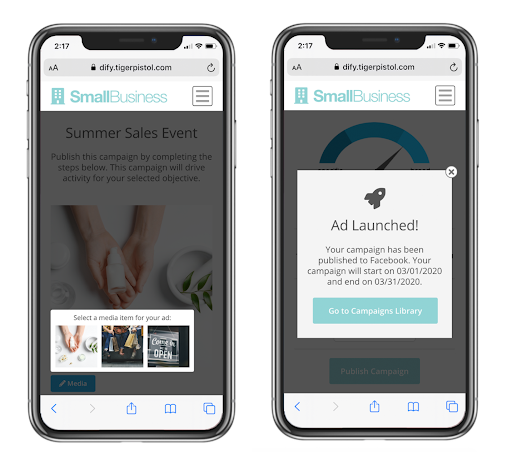To Automate or To Empower? Brands, Partners, and Co-Marketing Solutions
To automate or empower? That is the question facing brands that rely on channel partners to drive sales. As co-marketing tools for social advertising have developed, brands that rely on retail channel partners or sales agents to sell their products are faced with a unique dilemma. They can empower these intermediaries with the tools to publish their own social advertising campaigns, or they can simply use them as fronts in a centralized model with auto-published co-marketing content. So what will work best for your brand? Let’s start with the basics.
What is your objective for your co-marketing strategy? If your brand is looking to enable your channel partners with the skills and technology to develop their own social campaigns for your brand, using a decentralized model is the way to go. This approach can have many benefits outside the campaign results themselves, such as increasing preference for your brand as a vendor, as well as aiding your field sales teams in their efforts to supply partners. A ready-made co-marketing solution you can point to, positions your brand as a digitally forward enabler of sales for channel partners. In addition to driving conversions for your products directly at their point of sale. The decentralized model provides flexible funding options between brand and intermediaries as well as more room for channel partners to personalize a campaign’s copy and creative.
This contrasts with a centralized model, in which intermediaries are not participants in the publishing process, but instead simply the hero of the marketing story. If your brand wants to create hyper-targeted campaigns, without the need for trade or field management, the centralized model is the way to go. In this model, all social advertising is controlled and funded by the brand. With advanced automation and geo-targeting technology, a centrally managed program will dynamically localize brand controlled advertisements to reach their desired indirect channels. No matter the approach, the output is typically the same, co-marketing campaigns between brands and their local points of sale. And both management styles address the crucial need to advertise through indirect channels.
Decentralized Local Social Advertising Use Case
A Fortune 500 real estate services provider with a network of over 200,000 real estate agents serving multiple franchises sought a method to differentiate themselves in the market, as well as help their agents with marketing strategies. Tiger Pistol provided the real estate brand a solution that empowers its brokerages and agents with a collaborative social advertising platform that publishes campaigns directly from an agent’s own branded Facebook Page. In which agents can receive leads in real time, promote their website, or generate targeted reach in their sales area. The publishing engine is integrated with the brand’s agent and listing data, campaigns are pre-built and allow agents to customize within the brand’s defined guardrails, based on their business needs. Furthermore, the system handles local compliance to automatically populate the agents’ license number in a locked portion of the ad copy while also adhering to Facebook’s HEC Compliance requirements.The program’s customization capabilities permit agents to highlight local dialect and make it easier for the brand to meet the consumer where they are. Using a decentralized model enables both the brand and the agent to thrive, increasing agent satisfaction and retention. Though decentralized programs require some field enablement, its flexible funding options and potential for higher channel engagement, as well as increased activity (if it’s an on-demand solution) make this model worthwhile.

Centralized Use Case
A centrally managed program isn’t better or worse than a de-centrally managed program, it’s just different. An example, a digital marketing agency partners with Tiger Pistol to run templated ads for a popular car brand. In this centralized management model, the brand has complete control over the campaign template and copy but with control comes a greater degree of work required on their behalf. Dealers are able to optionally connect their own Facebook page, but otherwise all receive a brand campaign from the agency that automatically publishes. Tiger Pistol’s platform dynamic localization allows the agency to publish thousands of campaigns in less than fifteen minutes. Plus, with the solution’s geo-fencing technology, campaigns are further localized to bring consumers to the relevant inventory section of the local dealer site.

Consumer products brands, retailers, and service brands that utilize sales agents have the inevitable challenge of relying on intermediaries to sell their products. Unfortunately, digital marketing tools have been slow to account for these specific needs despite such a high degree of indirect channel sales (75% of worldwide sales according to the World Trade Organization). Don’t let your brand fall behind the curve. Utilizing a collaborative advertising approach in your social strategy will permit your brand to increase local engagement, sales, and acquisition.
Discover how Tiger Pistol can power your local advertising success.
Related Posts
Collaboration in the Metaverse
There has been much talk about the Metaverse, what it is, what it will be, and how it might take over the world. Fact of the matter is, no one quite knows how the Metaverse will take shape. The Venture Capitalist Matthew Ball states it will be based on these core principles: 1. It’s about […]
Can Every Ad Speak to Me? Chasing the Holy Grail of Collaborative Social Advertising
The Math The World Trade Organization says the world GDP is $80 trillion. The organization also says that 75% of worldwide sales flows through indirect channels. How many reasons does your brand have to capitalize on indirect channel sales with collaborative advertising? 60 Trillion Reasons Yet, many brands still rely on antiquated and ineffective methods [&h
Decentralized Social Networks: Advantages for Brands
Traditional centralized social networks have dominated our digital lives, but a disruptive force is emerging—one that offers unprecedented advantages. With Meta’s introduction of its new social platform, Threads, and its impending move to the decentralized networking protocol ActivityPub, brands are forced to reconsider the status quo. Decentralized social
Engaging Health & Beauty Consumers: Strategic Use of Facebook, Instagram, TikTok, and Amazon
In the rapidly evolving health and beauty industry, technology is driving transformative changes in how consumers engage with products and services. For instance, nearly 60% of users have made a beauty purchase after seeing the product on social media and, specifically, 89% of TikTok users have made a beauty purchase after seeing a product on the platform,




